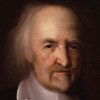“ Truth and falsehood are not sharply defined opposites, as is commonly supposed; nothing is wholly false, and nothing that we can know is wholly true. ”
Bertrand Russell, A History of Western Philosophy (1945). copy citation
| Author | Bertrand Russell |
|---|---|
| Source | A History of Western Philosophy |
| Topic | falsehood truth |
| Date | 1945 |
| Language | English |
| Reference | |
| Note | |
| Weblink | http://www.ntslibrary.com/PDF%20Books/History%20of%20Western%20Philosoph... |
Context
“This, of course, must be the case in Hegel’s system, for the highest kind of knowledge must be that possessed by the Absolute, and as the Absolute is the Whole there is nothing outside itself for it to know.
In the best thinking, according to Hegel, thoughts become fluent and interfuse. Truth and falsehood are not sharply defined opposites, as is commonly supposed; nothing is wholly false, and nothing that we can know is wholly true. “We can know in a way that is false”; this happens when we attribute absolute truth to some detached piece of information. Such a question as “Where was Caesar born?” has a straightforward answer, which is true in a sense, but not in the philosophical sense.”
source


